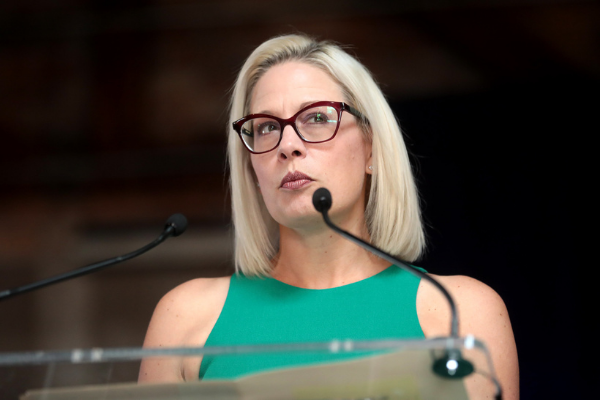James Factora doesn’t remember being particularly impressed when Kyrsten Sinema was first elected, but they remember the exact moment they felt disappointed in her as the sole representation of bisexual people in Congress.
It was when Sinema, a Senator from Arizona who ran largely on the fact that she was once homeless, voted against a $15 minimum wage with a cheeky thumbs down.
Sinema is also known among Democrats for her hesitancy to Build Back Better, and infamously opposing ending the filibuster that stands between Democrats and passing the Equality Act.
Last June, over 140 LGBTQ+ leaders in Arizona called on Sinema to make political moves that would benefit queer and transgender people. In October, one of Arizona’s Sunrise Movement chapters launched a “Hot Bisexuals Against Kyrsten Sinema” phonebank. As the only known bisexual representation in Congress makes headlines for confusing political priorities, bisexual people are pissed.
For Factora, a freelance writer, Sinema is an example of the “blue no matter who” sentiment, where Democrats urge other left-voting people to blindly support Democratic candidates. When it comes to Sinema, the dashed expectation that she would advocate for progressive legislation protecting LGBTQ+ Americans was a let-down that is reflective of a larger problem.
“My frustrations about her just come from my general frustrations with representation politics at large,” they tell Tagg. “She just feels like such a perfect encapsulation of this whole notion that politicians’ identities are something that we should care about, or factor into our decision making.”
Factora wrote an article for them. last October imploring Sinema on behalf of bisexuals to “stop standing in the way of this monumentally important legislation for the sake of your own confusing and opaque political vanity.”
For many bi people, the fact that Sinema has actively voted against or blocked certain protections for LGBTQ+ people means that she is retreating into the comfort of heteronormativity when it matters.
It’s notable to the bi community that Sinema fits neatly into one of the largest stereotypes of bi women — that they are cis, white, blonde women who are married to men. And while fitting into that trope doesn’t make a person less bisexual, it does subscribe to the most visible demographic of bisexuality.
“It’s paradoxical really, because […] that then contributes to the stereotype of who bisexuals are and it reduces the experience, it reduces the the knowledge of the bisexual experience that is necessary to inform,” says Lux Alptraum, the author of Faking It: The Lies Women Tell About Sex — And the Truths They Reveal and an NBC op-ed “Is Arizona’s Kyrsten Sinema bad for bisexual Americans?”
Sinema is often mentioned in tandem with two stereotypes of bi women — deceitful and untrustworthy — as she makes moves that Democrats neither trust nor expect. It’s not the kind of representation bisexuals hoped for when she was elected.
There have only been three other known bisexual members of Congress. Two of them were white Republican men: Stewart McKinney, who was outed after he died of complications related to AIDS in 1987, and Michael Huffington, a representative from California who ran unsuccessfully for Senator after he came out. The only other known bi woman in Congress was Katie Hill, who resigned in 2019 after a scandal involving revenge porn, an abusive ex-husband, and inappropriate sexual relationships with male and female staffers discussed publicly in a way that — you guessed it — reeked of biphobia.
In fact, there are many more openly gay or lesbian members of Congress than there are bi ones, despite the fact that there are significantly more self-identifying bi people than gay and lesbian people in the U.S., according to a 2021 Gallup poll. So, are there a number of closeted bisexuals already in Congress? Are bisexual people afraid of running for office, or just not getting elected? According to the LGBTQ Victory Fund, 70 bisexual people and 14 pansexual people are serving in elected office nationwide outside of Congress, compared to 523 gay people, 267 lesbians, and 75 queer people.
“Because Sinema is the only bisexual Senator and because these are things that align with negative ideas that people have about bisexuals, it just takes on on this weight,” Alptraum tells Tagg. “I’m not saying people shouldn’t criticize her, but I am saying to me it becomes less and less about her and more about this question of why is she the only bisexual in Congress?”


